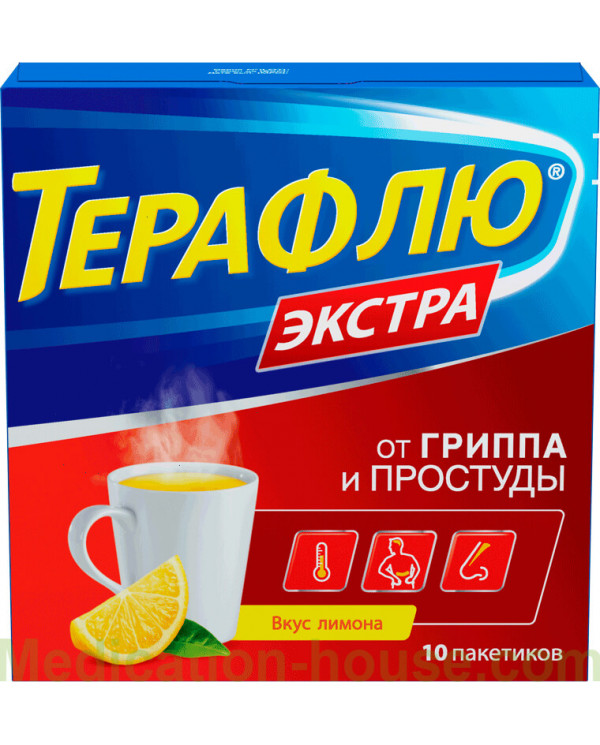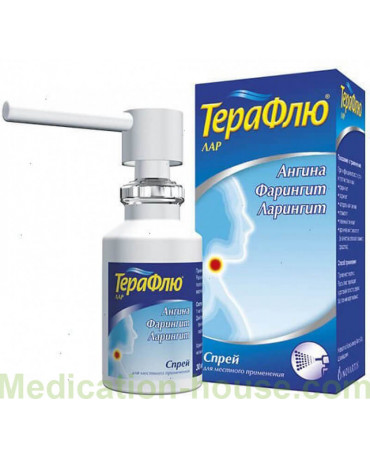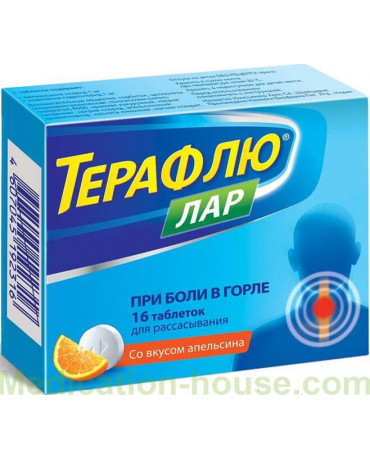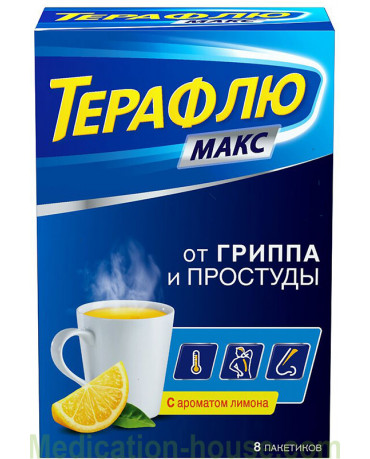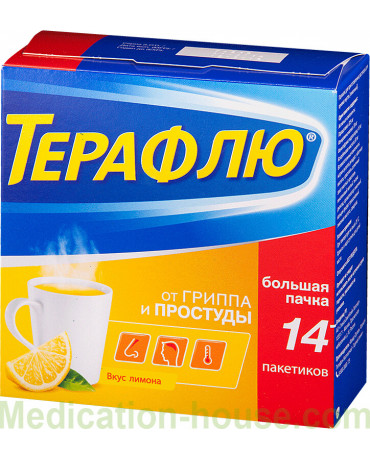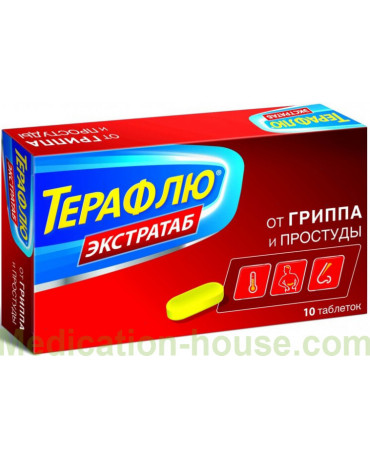TheraFlu Extra instruction
You can buy TheraFlu Extra here
TheraFlu Extra is a medicine with anti-congestive, anti-allergic, analgesic and antipyretic effects.
Release form and composition
Dosage form TheraFlu Extra - powder for the preparation of a solution for oral administration (lemon): loose, containing white and yellow granules, with a specific smell; soft lumps are possible (in 15 g sachets; in a cardboard bundle 1–8, 10, 12 or 25 sachets).
Composition TheraFlu Extra (1 sachet):
active substances: paracetamol - 0.65 g; pheniramine maleate - 0.02 g; phenylephrine hydrochloride - 0.01 g;
auxiliary components: calcium phosphate - 0.035 g; sodium citrate dihydrate - 0.18 g; citric acid - 1 g; natural lemon flavor Durarome860.202 TD 09.91 - 0.035 g; natural lemon flavor WONF Durarome 860.098 TD - 0.3 g; silicon dioxide - 0.013 g; maltodextrin M 100 - 0.026 g; dye sunny sunset yellow - 0.000 035 g; quinoline yellow dye - 0.000 147 g; potassium acesulfame - 0.019 g; sucrose - 12.6 g.
Pharmacodynamics
TheraFlu Extra is a combination drug whose action is due to the components contained in it. The tool eliminates swelling of the mucous membrane of the nasal cavity and nasopharynx, narrows the vessels of the nose, eliminates the symptoms of the common cold, has a vasoconstrictive, analgesic and antipyretic property.
The actions of the active components of the drug:
paracetamol: by suppressing the synthesis of prostaglandins in the central nervous system, it has an antipyretic and analgesic effect; does not affect hemostasis and platelet function;
pheniramine maleate: histamine H1 receptor antagonist (antiallergic agent); exhibits antimuscarinic activity; has a moderate sedative effect; eliminates allergy symptoms;
phenylephrine hydrochloride: a sympathomimetic agent; through stimulation of alpha1-adrenergic receptors has a moderate vasoconstrictor effect, reduces hyperemia and swelling of the nasal mucosa (with topical application).
Pharmacokinetics
Paracetamol Characteristic:
absorption: quickly and almost completely absorbed from the gastrointestinal tract; Cmax (maximum plasma concentration) after oral administration is achieved after 10-60 minutes;
distribution: present in breast milk, crosses the placenta, distributed in most tissues of the body; has a slight connection with proteins when used in therapeutic concentrations (it increases with an increase in its concentration);
metabolism: undergoes primary metabolism in the liver;
excretion: mainly excreted in the urine of sulfate and glucuronide compounds; its T½ (half-life) varies from 1 to 3 hours.
Pheniramine Maleate Characteristic:
absorption: Cmax is reached approximately after 1–2.5 hours;
excretion: T½ is 16–19 hours; from 70 to 83% of the dose taken is excreted through the urine unchanged or in the form of metabolites.
Characteristics of phenylephrine hydrochloride:
absorption: absorbed from the gastrointestinal tract; the time to reach Cmax varies from 45 minutes to 2 hours;
metabolism: undergoes primary metabolism in the intestines and liver;
excretion: excreted in the urine almost completely in the form of sulfate compounds; T½ is 2-3 hours.
Indications for use
According to the instructions, TheraFlu Extra is prescribed for the symptomatic treatment of infectious and inflammatory diseases: acute respiratory viral infection (ARVI), including the common cold and flu, accompanied by muscle pain, sneezing, stuffy nose, runny nose, headache, chills, fever.
Contraindications
Absolute:
severe cardiovascular pathologies;
portal hypertension;
arterial hypertension;
angle-closure glaucoma;
pheochromocytoma;
hyperthyroidism;
alcoholism;
diabetes;
glucose-galactose malabsorption, fructose intolerance, sucrose / isomaltase deficiency;
combination therapy with paracetamol-containing drugs, beta-blockers, tricyclic antidepressants or other sympathomimetic drugs; combined use or use of monoamine oxidase inhibitors over the previous 14 days;
age under 12 years old;
pregnancy;
lactation period;
individual intolerance to any component in TheraFlu Extra.
Relative (diseases / conditions in the presence of which the prescription of the drug requires caution):
severe atherosclerosis of the coronary arteries;
cardiovascular diseases;
acute hepatitis;
hemolytic anemia;
bronchial asthma;
severe liver / kidney disease;
prostatic hyperplasia;
difficulty urinating, caused by hypertrophy of the prostate gland;
blood pathology;
glucose-6-phosphate dehydrogenase deficiency;
congenital hyperbilirubinemia (syndromes of Rotor, Dubin-Johnson, Gilbert);
pyloroduodenal obstruction;
chronic malnutrition and dehydration;
stenotic gastric and / or duodenal ulcer;
epilepsy;
combined use of drugs that may have a negative effect on the liver.
Instructions for use TheraFlu Extra: method and dosage
The solution prepared from the powder is taken orally in a hot form, at any time of the day (preferably before bedtime, at night).
To prepare the solution, the contents of 1 sachet are dissolved in 0.25 liters of hot water (boiling water cannot be used).
The maximum daily dose is 3-4 packets, 1 every 4-6 hours.
The duration of treatment is 5 days (cannot be exceeded).
In the absence of symptom relief within 3 days of taking TheraFlu Extra, it is recommended to consult a doctor for advice.
Side effects
Possible adverse reactions (> 10% - very often;> 1% and <10% - often;> 0.1% and <1% - infrequently;> 0.01% and <0.1% - rarely; <0, 01% - very rarely):
blood and lymphatic system: very rarely - pancytopenia, leukopenia, agranulocytosis, thrombocytopenia;
immune system: rarely - angioedema, hypersensitivity; frequency unknown - toxic epidermal necrolysis, Stevens-Johnson syndrome, anaphylactic reaction;
psyche: rarely - sleep disturbance, increased irritability;
nervous system: often - drowsiness; rarely - headache, dizziness;
organ of vision: rarely - increased intraocular pressure, paresis of accommodation, mydriasis;
heart: rarely - palpitations, tachycardia;
blood vessels: rarely - increased blood pressure;
gastrointestinal tract: often - vomiting, nausea; rarely - diarrhea, stomach discomfort, constipation, dry mouth;
liver and biliary tract: rarely - increased activity of liver enzymes;
skin and subcutaneous tissue: rarely - urticaria, erythema, pruritus, rash;
kidneys and urinary tract: rarely - difficulty urinating;
general disorders: rarely - malaise.
Overdose
Paracetamol Overdose
The main symptoms: on the first day - vomiting, nausea, anorexia, pallor of the skin. Perhaps hepatotoxic effect, liver necrosis, irreversible nephropathy with liver failure. The first sign of liver damage may be pain in the stomach; usually it does not occur in the first 1-2 days, and sometimes it can appear after 4-6 days, on average 3-4 days after taking the funds. There is also the likelihood of developing metabolic acidosis and impaired glucose metabolism, acute renal failure and acute tubular necrosis (even in the absence of liver damage). There are reports of cardiac arrhythmias and pancreatitis. In elderly patients, children, with liver pathologies, chronic alcoholism, chronic malnutrition, and with the combined use of enzyme activity inducers, the risk of poisoning is especially pronounced. An overdose of paracetamol can be liver failure, encephalopathy, coma, and death.
Therapy: administration of activated carbon, oral administration or intravenous administration of N-acetylcysteine, gastric lavage, administration of methionine orally for at least 2 days after an overdose. Monitoring of blood circulation and respiration is important. With the development of seizures, diazepam can be used.
Overdose due to phenylephrine hydrochloride and pheniramine maleate
The main symptoms: drowsiness with a further increase in blood pressure, behavior change, development of bradycardia, convulsions, circulatory disorders, nausea, vomiting, rash, visual disturbances, headache, increased irritability, dizziness, insomnia, anxiety (especially in children), coma. There are reports of atropine-like psychosis with an overdose of feniramin.
Therapy: taking activated charcoal, saline laxatives, the use of measures to support respiratory and cardiac functions. Stimulants cannot be prescribed. In cases of hypertension, vasopressor agents may be used; increase in blood pressure - the introduction of alpha-blockers intravenously; convulsions - the appointment of diazepam.
special instructions
TheraFlu Extra can not be combined with alcohol, as this can cause toxic liver damage.
Patients with diabetes should be aware that 1 bag of powder contains 12.6 g of sucrose.
The sunset yellow contained in the dye may cause allergic reactions.
When following a diet with a limited intake of sodium, it is important to take into account the content of 0.18 g of sodium in 1 sachet of powder.
The drug in damaged bags is not recommended.
Influence on the ability to drive vehicles and complex mechanisms
During therapy, TheraFlu Extra is recommended to refrain from driving vehicles and conducting potentially dangerous activities, since the drug can cause drowsiness.
Pregnancy and lactation
TheraFlu Extra is contraindicated in pregnancy and lactation.
Use in childhood
For children under the age of 12, taking TheraFlu Extra is contraindicated.
With impaired renal function
TheraFlu Extra is prescribed with caution in case of renal failure. In acute renal failure, the interval between taking the drug should be 8 hours.
With impaired liver function
With severe liver pathology, TheraFlu Extra is prescribed with caution.
With impaired liver function or Gilbert's syndrome, the dose of the drug is reduced or the interval between its doses is increased.
Drug interaction
With the combined use of TheraFlu Extra with some drugs / substances, the following effects may develop:
sedatives, ethanol, monoamine oxidase inhibitors: paracetamol enhances their effects;
other drugs containing paracetamol, barbiturates: the risk of hepatotoxicity increases;
alcohol: with excessive or chronic use, it may increase the hepatotoxicity of paracetamol;
narcotic drugs, tranquilizers, barbiturates, antiparkinsonian drugs, alcohol, tricyclic antidepressants, monoamine oxidase inhibitors: pheniramine maleate can enhance their effect on the central nervous system;
anticoagulants: pheniramine maleate can inhibit their action;
monoamine oxidase inhibitors: phenylephrine hydrochloride can enhance their effect and cause hypertensive crisis;
tricyclic antidepressants, other sympathomimetic drugs: phenylephrine may increase the risk of developing their cardiovascular side effects;
beta-blockers and other antihypertensive drugs: phenylephrine may reduce their effectiveness;
digoxin and cardiac glycosides: phenylephrine may increase the risk of developing arrhythmia or heart attack;
ergot alkaloids: phenylephrine may increase the risk of ergotism.
When combined with probenecid, the dose of paracetamol is reduced.
In cases where a uric acid test is performed using the precipitating reagent phosphovolframate, it should be borne in mind that paracetamol can affect its results.
Terms and conditions of storage
Store in a place protected from light and moisture at temperatures up to 25 ° C. Keep out of the reach of children.
Shelf life is 2 years.
Reviews about TheraFlu Extra
According to reviews, TheraFlu Extra is a fast-acting, palatable, convenient to use and effective medicine. Among the shortcomings, they mainly mention the presence of a large list of contraindications, the development of side effects and the cost of the drug.
Terms of sell
You don't need a prescription to buy TheraFlu Extra.

